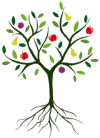Reverend W. Wilks
Reverend W. Wilks is a well-known English cooking apple, very much in the vein of the Victorian culinary apple tradition, although it was developed a bit later, in the early 1900s. It is thought to be derived from Ribston Pippin and Peasgood Nonsuch, both well-regarded English culinary apples.
Reverend W. Wilks ripens at the end of August and produces a well-flavoured tangy but sweet puree when cooked. The apples are large and juicy, but less sharp than some later-season cookers such as Bramley.
Reverend W. Wilks apple trees for sale
1-year bare-root
tree
on MM106 rootstock£34.95
Mature height: 3m-5m after 10 years
Can be trained on as a large free-standing apple tree, a half-standard apple tree, a large apple fan or espalier, or a pleached apple tree. Available next season
Growing and Training
Reverend W. Wilks is a good choice for anyone wanting an easy early-season cooker. It is easy to grow, heavy-cropping, reliably self-fertile, and has excellent natural disease-resistance. The tree is a compact grower.
The only issue to look out for is a tendency towards biennial-bearing - fruiting only every other year as it gets older. This can be addressed by heavy thinning of the fruitlets in early June of the "on" year.
Recommended pollinators for Reverend W. Wilks apple trees
Reverend W. Wilks is self-fertile, so you do not need another variety to pollinate it to produce fruit.
However you are likely to get a better crop if you plant any of the following pollinator varieties nearby.
If you are not sure about pollination requirements don't hesitate to ask us.
Red WindsorRed Windsor is one of the easiest to grow of all dessert apple trees, and with a pleasant apple flavour.
BountifulBountiful is an easy-to-grow cooking apple, it retains its shape when cooked, fairly sweet for a cooker.
GreensleevesGreensleeves is a reliable and popular mid-season green/yellow apple, easy to grow and productive.
Egremont RussetEgremont Russet is the most popular English russet variety, and a good apple tree for the garden.
BardseyA hardy disease-resistant apple, discovered growing on an island off the west coast of Wales.
Keswick CodlinKeswick Codlin is a popular early-season cooking apple, easy to grow, and productive in most climates.
Stirling CastleA traditional Scottish cooker from the Victorian era, with a good sharp flavour.
Red SentinelMalus Red Sentinel has classic white blossom and a profusion of tiny scarlet persistent fruits.
History
Developed by Mr Veitch of Chelsea at the start of the 20th century, and quickly recognised by the RHS (it received an Award of Merit in 1904).
Reverend W. Wilks characteristics
- Gardening skillBeginner
- Self-fertile?Self-fertile
- Pollinating othersAverage
- Pick seasonEarly
- Keeping2-3 weeks
- Food usesCulinaryTraditional cooker
- Country of originUnited Kingdom
- Period of origin1900 - 1949
You might also like these varieties
Bramley's SeedlingBramley is the essential English cooking apple, famous for its rich sharp acidity.
Howgate WonderHowgate Wonder is a large cooking apple which keeps well. Produces an excellent sharp juice.
Keswick CodlinKeswick Codlin is a popular early-season cooking apple, easy to grow, and productive in most climates.
Lord DerbyLord Derby is a high-quality mid/late-season traditional English cooking apple, cooks to a chunky puree.
More about apple trees
We've all grown up with Bramley cookng apples so we take it for granted that cooking apples are different to eating apples, but, surprisingly, the UK is one of the few countries that makes such a distinction between apples for cooking and apples for eating fresh.
The main qualtities of a good "cooker" are size - the bigger the better - and acidity. Counter-intuitively, it is the acid which gives cooking apples their flavour. In contrast the flavour of sweet dessert apples collapses with cooking.
Cooking apples are usually easier to grow than eating apples, and will tolerate partial shade.
